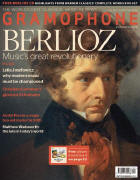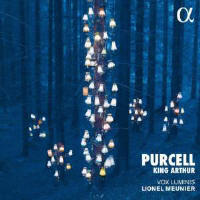Texte paru dans: / Appeared in: |
|
 |
Outil de traduction (Très approximatif) |
|
Reviewer:
David Vickers Vox Luminis, directed with a light touch by bass Lionel Meunier, turn their egalitarian talents to King Arthur (1691) and harvest the fruits of Purcell and Dryden’s collaborative imagination with affectionate lucidity. The band never sounds as small as it actually is – the single strings led adroitly by Cecilia Bernardini are underpinned by a bass violin (rather than cello) and there is no double bass, according to scholarly thinking about Purcell’s likely practices. The playing has admirable finesse, although a soft bass drum thudding during the Second Music aire adds nothing of value. A couple of short instrumental pieces from Bonduca and The Old Bachelor are inserted unobtrusively. The Saxons’ heathen sacrifices in Act 1 flow with unerring pacing and harmonic shaping (the choral shaping of the line ‘Die and reap the fruit of glory’ is exquisite); the arrival of the valorous Britons in ‘Come, if you dare’ is performed with swashbuckling panache by Robert Buckland and swaggering trumpets. In Act 2, a chortling pair of oboes lead the way for competing good and bad spirits calling to Arthur and his beleaguered soldiers in ‘Hither, this way’, voiced by the ensemble with gleeful theatricality in response to Caroline Weynants’s sparkling Philidel. Soft pastoral recorders (rather than strings) are used for ‘How blest are shepherds’, sung mellifluously by Olivier Berten and the chorus; in the duet ‘Shepherd, shepherd, leave decoying’ a tambourine is played so discreetly that it has little point being there (it is let off the leash in the ensuing hornpipe). The Frost scene in Act 3 has icy scraping from the violins to accompany the awakening of Sebastian Myrus’s precise Cold Genius (every shivering note in the right place); possessing a vivid vibrato, Sophie Junker’s swooping Cupid has a whiff of mischief as master of ceremonies; the arrival of the frosty chorus in need of love to warm them up is slower than Purcell probably intended but its characterisation aptly shows them ‘qui’vring with cold’. In Act 4, Zsuzsi Tóth and Stefanie True entice Arthur to ‘come and bathe with us an hour or two’ with imploring urgency; the passacaglia ‘How happy the lover’ has the elegant sway of courtly dancing. In the Act 5 masque, Marcus Farnsworth’s Aeolus is more ‘serene and calm’ than ‘blustering’ (which seems right to me); the reflective mood of the fine-drawn trio ‘For folded flocks’ is rudely broken by slurry strings and the drunken irreverence of peasants for a raucous account of ‘Your hay it is mow’d’, plunging without pause into Venus’s sublime blessing ‘Fairest isle’ (Tóth introducing sophisticated embellishments in the last verse). True and Farnsworth’s dialogue for two reconciling lovers ‘He’ and ‘She’ (which parallels the unification of Arthur and Emmeline) has beguiling tenderness. Although the booklet essay and synopsis are unduly cursory, it has been decades since a recording of any of Purcell’s operas as enjoyable as this. |
|




